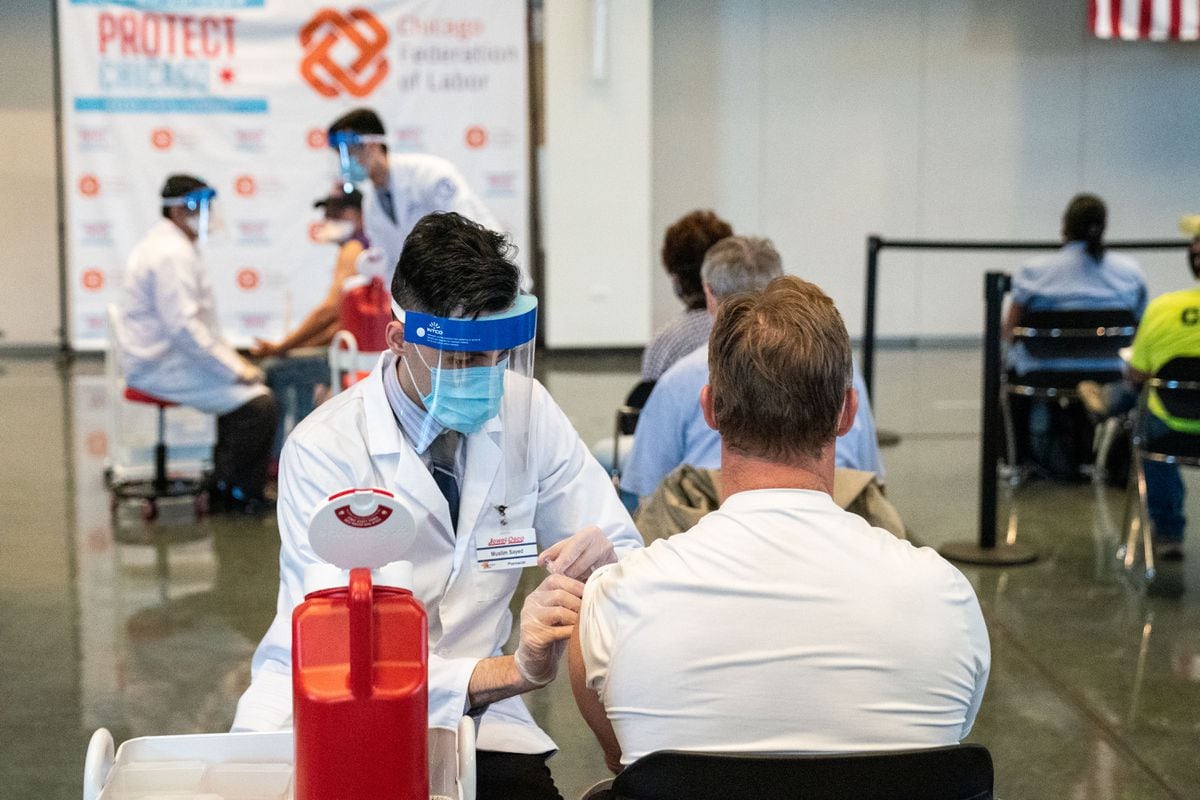The European Medicines Agency (EMA, for its acronym in English) confirmed Tuesday that there is a "possible link" between the Janssen vaccine (a Johnson & Johnson subsidiary) and eight very rare cases of thrombi detected in the United States. The European regulator, whose Pharmacovigilance Risk Assessment Committee (PRAC) has been evaluating the aforementioned episodes, believes that "a warning about unusual blood clots with low platelets should be added" to the information on the pharmaceutical giant's vaccine, according to a statement issued this Tuesday. The PRAC has concluded that these events should be listed as "very rare side effects" of the drug. But he continues to recommend its use: "The overall relationship between risks and benefits remains positive."The conclusions are very similar to those established for AstraZeneca injections a couple of weeks ago.
The committee has evaluated "all the evidence currently available," according to the EMA, including eight reports of severe cases of unusual blood clots associated with low levels of platelets in the blood, one of which ended in death. .
The cases analyzed occurred in the United States, in people under 60 years of age and in the three weeks after vaccination.
The majority, according to the EMA, were women, although according to current data, "specific risk factors" have not been confirmed.
More information
Emer Cooke, Executive Director of the EMA: "It's not just about vaccines, we need more tests and more treatments"
Health and communities study to overturn the vaccination strategy and delay the second dose of Pfizer and Moderna
Despite the fact that this vaccine has not yet begun to be administered to the European population, the EMA announced on April 9 that it was officially beginning an investigation into the possible links between its inoculation and four severe cases of unusual clots with a low level of platelets. observed in the United States. Four days later, on April 13, the United States Centers for Disease Control and Prevention (CDC) and the Food and Drug Administration (FDA) jointly recommended to pause inoculation with this brand, after detecting six cases of cerebral venous sinus thrombosis observed in combination with low levels of platelets (thrombocytopenia) among the nearly seven million people who had received this vaccine. The EMA, in its statement this Tuesday,mentions eight cases. Following the recommendation of US regulatory bodies, the laboratory decided on April 13 to stop the deployment of the first doses of its vaccine in the EU, which had started just that week after several delays.
The executive director of the EMA, Emer Cooke, assured in a recent interview with EL PAÍS that even before the US decision they already had suspicions that there could be "a problem" with the Janssen vaccine "due to the similarities with that of AstraZeneca" , so the European agency began an investigation proactively. "The cases reviewed were very similar to those that occurred with the vaccine developed by AstraZeneca," he said in his statement on Tuesday. Both injections use a similar technology based on attenuated viruses and different from Pfizer-BioNTech and Moderna drugs, based on messenger RNA.
Two weeks ago, in a very similar opinion, the Amsterdam-based agency established that there is a causal relationship between vaccination with the AstraZeneca drug and more than 80 cases of blood clots detected in EU citizens (mostly women under the age of 18). 60 years) who had been administered this vaccine, although they are considered "very rare side effects," according to the EMA. The regulator has since required AstraZeneca to warn of this "unusual" possibility in product information, although it continues to recommend its use due to the drug's "high effectiveness" in saving lives.
Since then, several European countries have limited the use of AstraZeneca for certain age groups; the Government of Denmark, going one step further, has completely ruled out the use of this vaccine in its population. The EMA's new opinion on Janssen is likely to open a cascade of similar decisions.
The European regulator gave the go-ahead to Janssen's vaccine on March 11, making it the fourth authorized for use in the EU, but its rollout has since been delayed due to problems in its distribution. Immunization with this vaccine, the only one approved by Brussels that requires a single dose, is a central part of the European immunization strategy. The EU expects to receive 55 million doses of Janssen in the second quarter of the year, a substantial figure to reach the target of 70% of the adult population vaccinated this summer.
However, it is becoming increasingly clear that the community club is trusting its strategy to messenger RNA vaccines (Pfizer-BioNtech and Moderna), which already account for 73% of the 127 million doses distributed to Member States, and in specifically, to that of Pfizer (65%). The European Commission announced on Monday that it was activating the contractual option to acquire 100 million additional doses of Pfizer-BioNTech, which brings the deliveries of this company expected for 2021 to 600 million, enough to immunize 300 million people, a figure even higher than that 70% of the European adult population (255 million people).
“We have to focus on the technologies that have proven themselves. Messenger RNA vaccines are a clear example of this ", said last week the president of the Commission, Ursula von der Leyen, after announcing that she was opening a new negotiation with Pfizer-BioNTech to acquire 1.8 billion doses by 2023, with the sight put in its capacity of adaptation in front of the new variants.

